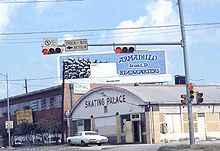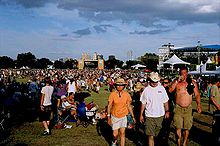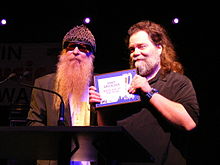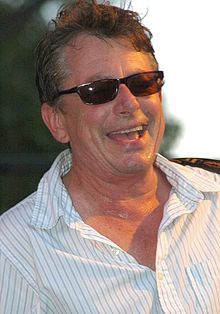- Music of Austin
-
The music of Austin, Texas, USA has gone beyond 6th Street and now includes other areas such as Red River, the University of Texas, the Warehouse District and Downtown, South Lamar, South Austin, East Austin and the Market District where bars and clubs of every kind can be found. Every night over one hundred venues stage live music. Austin's official motto is the "Live Music Capital of the World".
Contents
History
Austin's musical heritage began in 1933 when Threadgill's, a venue that later hosted renowned artists such as Janis Joplin, first opened its doors. Soon after in the 1940s, other music venues such as Liberty Lunch and the Victory Grill started popping up around the city. The Victory Grill, which was part of the "chitlin circuit" featuring big bands, jazz and blues, became famous for later hosting musical legends including B.B. King, Ike Turner and Tina Turner.
In 1964, Texas' last true dance hall, the Broken Spoke, opened. The late-1960s and 1970s saw the country music popularized by Willie Nelson and others being joined by a host of other music brought by the more liberal inhabitants, who migrated to Austin during these two decades. Specifically, Roky Erickson and his 13th Floor Elevators helped bring in this psychedelic era.
Austin was home to the Vulcan Gas Company that featured headliners such as the 13th Floor Elevators, (Johnny and Edgar) Winter brothers, and Shiva's Headband. The Vulcan morphed into the Armadillo World Headquarters in 1970 and for more than ten years featured music of all genres, from Bruce Springsteen to Bette Midler, as well as local ballet, blues and jazz. The artwork from this establishment was a part of the Austin scene and the Armadillo became the Austin city animal. Songs such as Gary P. Nunn's "London Homesick Blues" (which includes in the chorus "I want to go home with the armadillo") made this a staple of Austin. The artist who began the Armadillo logo was Jim Franklin, who is still working today.
In the following years, Austin gained a reputation as a place where struggling musicians could launch their careers in front of receptive audiences, at informal live venues. A major influence during this time was Clifford Antone and the namesake blues club he founded in 1975, at the age of 25. Antone's became one of the very first music venues on Austin's 6th Street and fostered the careers of a number of musicians, including Stevie Ray Vaughan. Liberty Lunch was a live-music venue in Austin, Texas that first began as an eatery. During its heyday in the late 1970s and 1980s, it featured all kinds of music, including reggae and ska, punk, indie, country and rock. The venue was forced to close to make way for Austin's downtown redevelopment rampage in the late 1990s. Since then, Liberty Lunch has attained a (partly deserved) legendary status in the history of Austin music. Now-defunct Armadillo World Headquarters has attained a similar status.
The punk/new wave era in Austin began in earnest in 1978. The Club Foot played an important role in hosting many of the local punk/new wave acts. The city's first two rock/new wave bands, the Skunks and the Violators, made their debut at a University-area club called Raul's in February. The explosive show by the Sex Pistols in San Antonio the previous month helped build toward an excited reception for local purveyors of the style.[1] The Skunks' lineup consisted of Jesse Sublett on bass and vocals, Eddie Munoz on guitar and Bill Blackmon on drums. The Violators featured Kathy Valentine (later of the Go-Go's), Carla Olson (later of the Textones), Marilyn Dean and Sublett on bass. The Violators were short-lived, as all the members except for Sublett moved to LA the following year. Margaret Moser, of the Austin Chronicle, later wrote that "The Skunks put Austin on the rock n' roll map." [2] Another influential band that led the punk scene in Austin was the Big Boys.
Austin became one of the important stops on every tour of important punk/new wave acts. Many of these bands, such as the Police, Joe Jackson, Blondie and Talking Heads, played at the Armadillo. A number of them, including the Clash, Elvis Costello and Blondie, would make appearances at gigs by the Skunks and take the opportunity to jam with the band.[2][3]
The 1980s and 1990s also helped shape Austin's music scene. Waterloo Records, which has been voted the best independent record store in the country and hosts live in-store shows, first opened in 1982. Austinite Stevie Ray Vaughan won a Grammy in 1990 for best contemporary blues album. After tragically dying in a helicopter crash, he was memorialized with a statue on the shores of Austin's Lady Bird Lake. Additionally in the early 1990s, Austin earned the title of Live Music Capital of the World, because of the number of live music venues. It still holds that title today.[4]
Visitors and Austinites alike may notice the 10-foot guitars standing on the sides of the city's streets. In 2006, Gibson Guitar brought Guitar Town to Austin, placing 35 of these giant guitars around the city.
The Austin Music Foundation is one of several Austin groups that help independent artists further their music careers. Assisting musicians with medical needs are the Simms Foundation and Health Alliance for Austin Musicians (HAAM). Helping to promote the $1 billion music industry in the city is the Austin Music Office. A department of the Austin Convention & Visitors Bureau, the Austin Music Office offers creative, personalized assistance in booking live music, discounted Austin Compilation CDs and mini-guides to the city's live music scene, assistance with utilization of live music venues for off-site events, and guidance with local music attractions and creation of music tours.[5]
Television
The PBS live music television show Austin City Limits began in 1976 and has featured, as of 2005, over 500 artists of various genres, including rock, folk, country, bluegrass and zydeco. Part responsible for Austin's reputation as a live music hub, the show is broadcast worldwide and stands as the longest running music television program ever. Public tours of Studio 6A are given on Fridays at 10:30 a.m.
Austin was also home to the Austin Music Network (AMN), which broadcast from 1994 to 2005. AMN, featured on cable channel 15, proclaimed itself to be the only non-profit independent music television channel, and its programming was mostly music videos or recorded live sessions, interspersed with presenters. Although all musical tastes were broadcast, AMN emphasized non-mainstream music such as indie, punk, blues, country and jazz.
Today channel 15 is still a 24-hour music channel now run by Music and Entertainment Television (M*E). M*E launched October 1, 2005 and is currently broadcast to Austin and the 44 surrounding cities. M*E is a regional network dedicated to showcasing and providing television exposure for regional artists as well as the hundreds of touring groups that make up the vibrant Texas live music scene. Supporting established artists and promoting and discovering new talent is a priority. M*E is the entertainment resource, with venue schedules, artist information, interviews and local live music shows every night at 7 p.m. on M*E Live! from Austin. M*E represents different musical genres and areas of the arts community with numerous original programs highlighting everything from filmmakers to art galleries, and musicians to the ballet. In addition, M*E's mostly music line-up, spotlights live performance footage, concept music videos as well as biographies, reviews, restaurant tours and more.[6]
Festivals
Austin is the home of South by Southwest (SXSW), an annual film, music and interactive conference and festival, and the expanding number of fringe events that take place during the festival, at venues all over town. In the fall, Austin hosts the Austin City Limits Music Festival (ACL) and the Fun Fun Fun Fest. Every summer, local businesses put on a series of free blues shows in Zilker Park entitled "Blues on the Green." Numerous other music festivals occur year-round. Other annual festivals include the "Keep Austin Weird Festival" and the Heart of Texas Quadruple Bypass Music Festival a.k.a. The Texas Rockfest.
Austin is home to other large annual festivals including:
- Carnaval Brasileiro
- Urban Music Festival
- Texas Wine and Food Festival
- Art City Austin
- Eeyore's Birthday Party
- Old Pecan Street Festival
- Pachanga Festival
- Republic of Texas Biker Rally
- Batfest
- First Night Austin
Venues
The Austin Chronicle, Austin Convention & Visitors Bureau and Do512 offer information on the most common venues that host local bands.
Below is a short list of notable venues:
- The Amsterdam
- Angel's
- Antone's
- Artz Rib House
- Austin Music Hall
- B. D. Riley's
- The Backyard
- Beauty Bar
- Beerland
- The Broken Spoke
- The Broken Neck
- Cactus Cafe (UT campus)
- Café Mundi
- Carlos 'n Charlie's
- The Carousel Lounge
- Cedar Street Courtyard
- Central Market
- Club De Ville
- The Continental Club
- Cotton Club
- Dirty Dog Bar
- Donn's Depot
- Ego's
- Elephant Room
- Elysium Night Club
- Emo's
- Evangeline Café
- Flamingo Cantina
- Flipnotics
- The Frank Erwin Center
- Friends
- The Ghost Room
- Guero's
- Headhunters
- Hill's Cafe
- Hole in the Wall
- Jovita's
- La Zona Rosa
- Liberty Lunch (closed)
- Lovejoy's
- Lucky Lounge
- Maggie Mae's
- The Mohawk
- Momo's
- Mulligan's
- Nasty's
- Nuno's
- Nutty Brown Café
- The Oaks
- One World Theater
- The Parish
- The Parlor
- Plush
- Poodies
- Radio Room
- Red 7
- Red Eyed Fly
- Red Fez
- Republic Live
- Reed's Jazz Club
- Room 710
- Ruta Maya International Headquarters
- Saxon Pub
- Scoot Inn
- Shooters
- Speakeasy
- Stubb's BBQ
- Threadgill's
- 311 Club
- Trophy's
In addition to the usual restaurant/bar venues listed above, Austin offers live music in unexpected places as well. These unique venues include:
- City Hall - Every Thursday, City Council honors a local musician at its council meeting. Also, the free concert series "Live from the Plaza" takes place at City Hall every Friday at noon from April to December.
- Austin-Bergstrom International Airport - Live music is featured 11 times a week at four locations.
- Grocery Stores - Central Market features live music three times a week, while Whole Foods Market hosts the "Music at the Market" music series every Thursday evening in the spring.
- Road Races - The Austin Marathon hosts more than 30 bands along the race course and the Capitol 10K features a band at every mile marker.
Musical acts
Some Austin musicians who are currently active in the city include:
- The Alice Rose
- Alpha Rev
- The American Analog Set
- …And You Will Know Us by the Trail of Dead
- Arc Angels
- ArcAttack
- Asylum Street Spankers
- Austin Lounge Lizards
- Averse Sefira
- Balcones Fault
- Marcia Ball
- Balmorhea
- Band of Heathens
- Best Fwends
- Big Boys
- The Black and White Years
- The Black Angels
- Black Books
- The Boxing Lesson
- Blue October
- Bubble Puppy
- Maya Bond
- The Bright Light Social Hour
- Brobdingnagian Bards
- Doyle Bramhall II
- Butthole Surfers
- Canvas
- Cindy Cashdollar
- Charalambides
- Chingon
- Lakrea Clark
- W. C. Clark
- Slaid Cleaves
- Shawn Colvin
- Court Yard Hounds
- Alvin Crow
- Kacy Crowley
- Death is not a joyride
- Del Castillo
- Dexter Freebish
- The Dicks
- Joe Ely
- Alejandro Escovedo
- Esther's Follies
- Explosions in the Sky
- The Fabulous Thunderbirds
- Fastball
- Rosie Flores
- Michael Fracasso
- Future Clouds and Radar
- Davíd Garza
- Larry Gatlin
- Ghostland Observatory
- Eliza Gilkyson
- Jimmie Dale Gilmore
- Golden Arm Trio
- Goudie / Johnny Goudie
- The Gourds
- Govinda
- Jon Dee Graham
- Patty Griffin
- Grupo Fantasma
- Harlem
- Roy Heinrich
- Terri Hendrix
- Sara Hickman
- Tish Hinojosa
- I Love You But I've Chosen Darkness
- Jack Ingram
- Eric Johnson
- Robert Earl Keen
- Ben Kweller
- Jimmy LaFave
- The Lovely Sparrows
- Lower Class Brats
- Lloyd Maines
- Julian Mandrake
- Ian McLagan
- James McMurtry
- MDC
- Matt the Electrician
- Mineral
- Monte Montgomery
- Abra Moore
- Ian Moore
- Gurf Morlix
- Mothfight
- Trish Murphy
- Nathan's Stupid Drama
- Willie Nelson
- The Noise Revival Orchestra
- Matt Noveskey
- The Octopus Project
- Oh No! Oh My!
- Okkervil River
- One-Eyed Doll
- Ephraim Owens
- Michael Scott Parker
- Peel
- Patrice Pike
- Powderburn
- Toni Price
- Pushmonkey
- Quiet Company
- Reckless Kelly
- Recover
- Luke Redfield
- The Reivers
- Riddlin' Kids
- Carrie Rodriguez
- Bruce Robison
- Calvin Russell
- Shearwater
- Bob Schneider
- Charlie Sexton
- Soul Track Mind
- Soulhat
- Stars of the Lid
- Storyville
- Sunny Sweeney
- The Sword
- Owen Temple
- Rick Trevino
- Reed Turner
- Underwood
- Kathy Valentine
- Vallejo
- Jimmie Vaughan
- Patricia Vonne
- Voxtrot
- Jerry Jeff Walker
- Watchtower
- Dale Watson
- What Made Milwaukee Famous
- White Denim
- White Ghost Shivers
- Bobby Whitlock
- Kelly Willis
- Carolyn Wonderland
- The Yuppie Pricks
- Electric Touch
Musicians who previously contributed to the Austin music scene (including those who have broken up or moved from the city):
- 13th Floor Elevators
- Experimental Aircraft
- Gal's Panic
- Glass Eye
- Kellye Gray
- Greezy Wheels
- Nanci Griffith
- Marc Gunn
- The Impossibles
- Daniel Johnston
- Charlie Robison
- Scratch Acid
- Sound Team
- Spoon
- The Sword
- Thirteen of Everything
- Two Nice Girls
- Union Jack and the Megatones
- Unloco
- Volcano, I'm Still Excited!!
- Western Keys
- Wideawake
- Lucinda Williams
- Zykos
Deceased Austin musicians include:
- Stephen Bruton
- Janis Joplin
- Doug Sahm
- Randy Turner AKA Biscuit
- Stevie Ray Vaughan
- Don Walser
The Austin Music Memorial, at the Joe and Teresa Long Center, honors those who have contributed to the development of the Austin music community.
See also
References
- ^ The Austin Chronicle:December 8, 2000
- ^ a b Austin Chronicle
- ^ "Never the Same Again: A Rock N' Roll Gothic," memoir by Jesse Sublett, published 2004
- ^ Austin Music Guide
- ^ Austin Convention & Visitors Bureau
- ^ Music and Entertainment Television
External links
- Austin Convention & Visitors Bureau
- Austin Music Office
- The Austin Chronicle music listings
- Austin Music Foundation
- Music & Entertainment Television - Channel 15
- Austin music photos
- Permits and the Music Business in Austin, Texas
- Austin Jazz Alliance
City of Austin Counties Important
businessesHigher
educationMusic Antone's · Armadillo World Headquarters · Austin City Limits · Austin Lyric Opera · Austin Symphony Orchestra · Emo's · SXSW · Stevie Ray Vaughan · Willie NelsonLandmarks Austin-Bergstrom International Airport · Darrell K Royal-Texas Memorial Stadium · Dell Diamond · The Drag · Frank Erwin Center · Governor's Mansion · Lyndon Baines Johnson Library and Museum · Moonlight tower · Sixth Street · South Congress · State Capitol · Treaty Oak · UFCU Disch-Falk Field · University of Texas TowerParks and
preservesAuditorium Shores · Emma Long · Hippie Hollow · McKinney Falls · Mount Bonnell · Walnut Creek · Wild Basin · ZilkerBodies of
waterCategories:- Music of Austin, Texas
Wikimedia Foundation. 2010.




